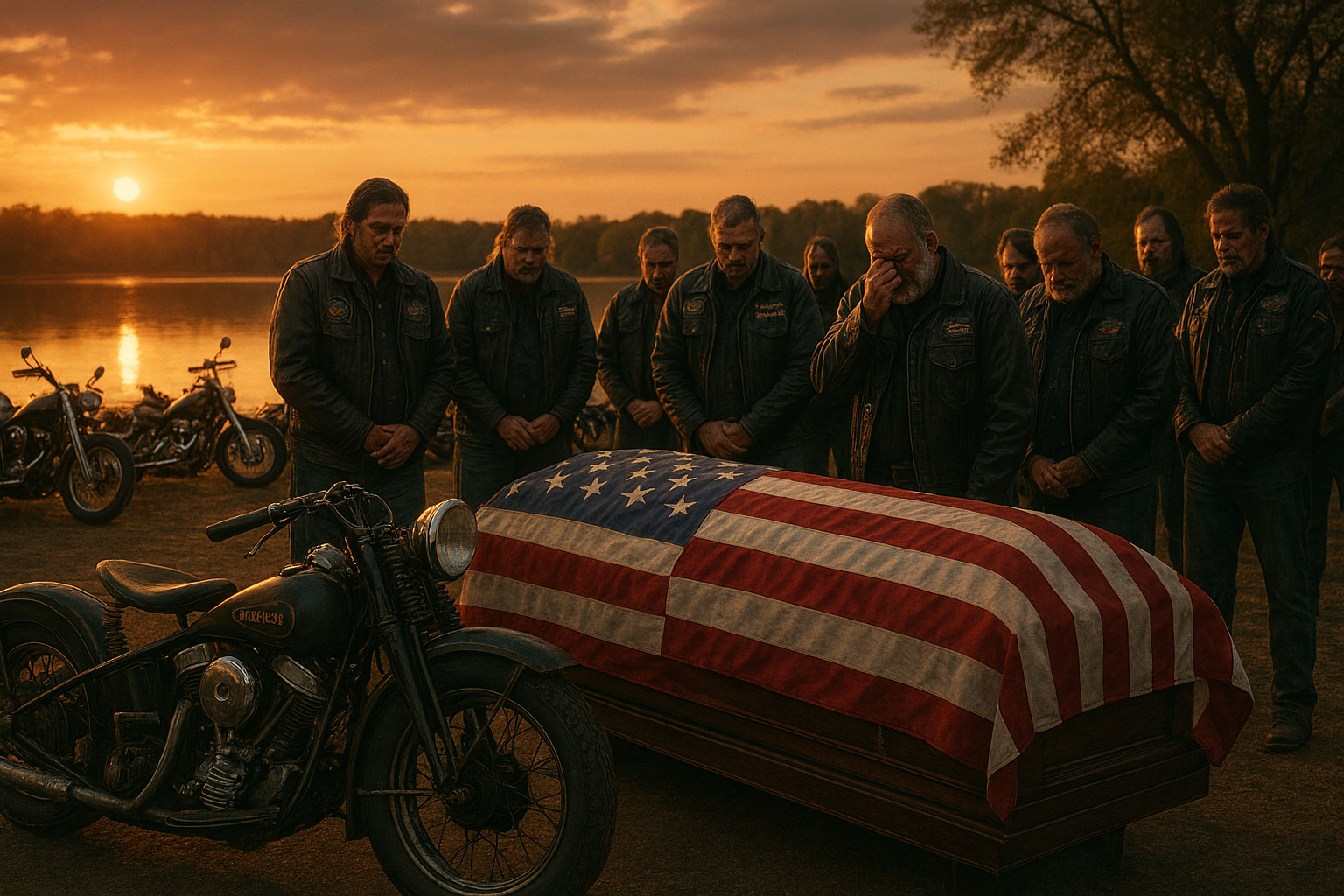The air hung heavy, not just with the impending chill of the late October evening, but with the profound, unshakeable weight of loss. It was a silence broken only by the gentle, rhythmic lapping of the lake against the shore and the occasional, muffled sob that couldn’t be held back. This was not a funeral set in the sterile confines of a chapel; this was a gathering of the faithful, an open-air rite of passage for one of their own: “Big Jim” Morrison.
Beside a stand of ancient, weeping willows, the coffin rested on twin wooden trestles. It was simple, solid oak, but what truly commanded attention was the shroud it wore: a crisp, regulation Stars and Stripes, the rich crimson and deep blue absorbing the fading light of the day.
And beside the flag-draped wood, standing sentinel, was the other great love of Jim’s life: a 1948 Harley-Davidson Panhead. Gleaming black and chrome, the bike was a testament to a bygone era, its paint meticulously maintained, its engine a legend of its own. It sat upright on its kickstand, silent now, its iconic potato-potato idle replaced by the quiet despair of its assembled brothers and sisters. There were no keys in the ignition; the final ride was over.
The Brotherhood of the Road
The lakeside setting was perfect. The water, calm and glassy, stretched out to the horizon, reflecting the vivid palette of the sunset. Oranges bled into pinks, which deepened into a sorrowful violet—a majestic, theatrical curtain call for a man who lived his life on stage.
Lining the path that led to the graveside were the bikes. Dozens of them. Harleys of every lineage—Fat Boys, Dynas, Sportsters—a silent, gleaming chrome honor guard. The scent of old leather, engine oil, and the faint, lingering whiff of campfire smoke mixed with the clean, earthy smell of the pine needles underfoot.
The mourners stood in a rough semicircle, their backs to the dying sun. They were a study in leather and defiance. Patches emblazoned with club names like the “Iron Horsemen” and “Rolling Thunder” covered their backs, each symbol a ledger of countless miles, shared struggles, and unbreakable bonds. Their faces, usually creased with laughter or hardened by the wind, were now soft, etched with genuine grief.
Echoes of Freedom
Grizz, Jim’s best friend and club president, stood nearest to the coffin. His massive shoulders, usually thrown back with proud swagger, were slumped. He reached out and gently rested a hand on the Panhead’s saddle, his fingers tracing the worn stitching. Grizz wasn’t crying, not outwardly, but a single tear had carved a clean, wet track through the dust and grime on his cheek. It fell, silent and heavy, onto the polished fender. That one tear spoke volumes about a forty-year friendship forged on the open road.
Nearby, Angel, the club’s youngest member, openly wept into the shoulder of his girlfriend. He hadn’t known Jim for long, but Big Jim had been the one to give him his first set of tools, his first good advice, and the stern but loving kick in the pants that put him on the straight and narrow. For Angel, Jim was more than a biker; he was an anchor.
The preacher, a man who seemed slightly out of place in his pressed suit among the leather, spoke softly. He didn’t quote scripture about saints and heavenly gates; he spoke about freedom. He talked about the sound of a Big Twin engine as a prayer, and the road as a sacred path.
“Jim didn’t need a church,” the preacher said, his voice thick with emotion. “His cathedral was the American highway. His bible was the map. His congregation was you. He lived a life unbound, a life of two wheels and the horizon. And if you listen real close right now,” he paused, gesturing to the silent Panhead, “you can hear the echo of his engine disappearing around that final bend.”
The Final Salute
The eulogy finished, and a profound silence descended again. It was the moment of the salute.
Grizz stepped forward, pulled off his heavy, road-worn gauntlet, and placed it on the coffin. He then walked to the Panhead and reached into the saddlebag, pulling out a small, tarnished silver flask. He unscrewed the cap, lifted it skyward in a silent toast, and poured a slow, deliberate stream of amber liquid—Jim’s favorite Kentucky bourbon—onto the ground near the front tire. A drink for the road ahead.
One by one, the other riders approached. Some tossed a few coins onto the flag, a tip for the ferryman. Others laid down small personal tokens: a broken spark plug, a lucky poker chip, a faded photograph.
The most dramatic moment came as the sun finally touched the horizon, setting the lake on fire with brilliant orange light. At a nod from Grizz, twelve riders, the core of Jim’s inner circle, stepped back to their motorcycles.
They didn’t start the engines. Instead, they raised their arms, forming a tunnel of hands. Then, one by one, they slammed their open palms onto their fuel tanks and fenders in a slow, deep, resonating beat. The “Rumble of the Absent Engine.” It was a powerful, rhythmic drumming that echoed across the water, a final, thunderous heartbeat for their lost brother.
The reflections on the lake were breathtakingly detailed, not only mirroring the fiery sky and the silhouettes of the men but also capturing the flicker of the few small lanterns they had placed around the gravesite—small beacons against the encroaching night.
It was an emotional, gut-wrenching farewell. A tribute not just to a man, but to a way of life—a life where your word was your bond, your leather was your armor, and the road was the only master. Big Jim Morrison was gone, but the spirit of the open road, the freedom he embodied, and the brotherhood he forged, would ride on in every soul gathered at the lakeside.
